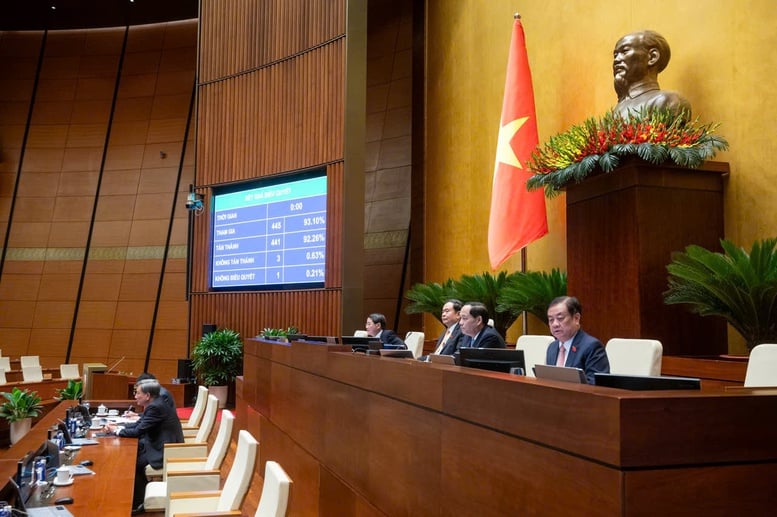TLDR
- Vietnam’s National Assembly passed the Law on Digital Technology Industry on June 14, legalizing crypto assets starting January 1, 2026
- The law creates two categories: virtual assets and crypto assets, both distinct from securities and fiat currencies
- Vietnam becomes the first country to enact standalone legislation specifically for the digital technology industry
- The law includes tax incentives, R&D support, and infrastructure benefits for AI, semiconductor, and digital companies
- Recent crypto scams like BitMiner and Million Smiles highlight the need for stronger AML safeguards
Vietnam’s National Assembly approved sweeping digital technology legislation on June 14. The Law on Digital Technology Industry will take effect on January 1, 2026. The country becomes the first nation to enact standalone legislation focused entirely on the digital technology sector.
The new law officially recognizes crypto assets within Vietnam’s legal framework. This marks a major shift for the Southeast Asian nation. The legislation moves beyond simple tolerance to formal legal recognition of digital currencies.
The law divides digital assets into two distinct categories. Virtual assets include non-financial tokens and digital goods used in gaming. Crypto assets encompass Bitcoin, Ethereum, and other cryptocurrencies based on blockchain technology.
Both asset types remain separate from securities, digital fiat currencies, and central bank digital currencies. These traditional financial instruments fall outside the new law’s scope. The government must now develop specific business conditions and oversight mechanisms for each category.

Vietnam has been on the Financial Action Task Force gray list since 2023. The new law mandates cybersecurity and Anti-Money Laundering safeguards aligned with international standards. This requirement aims to address FATF concerns about the country’s financial oversight.
Building a Digital Economy Hub
The legislation extends far beyond cryptocurrency regulation. Vietnam seeks to establish itself as a major digital technology center in Southeast Asia. The law provides extensive support for companies working in artificial intelligence and semiconductor development.
Tax breaks form a key component of the incentive package. Companies developing core technologies like chip design and AI data centers qualify for these benefits. Land-use advantages and research and development subsidies complement the tax incentives.
Regional governments receive direction to support workforce development programs. These initiatives include subsidies and training programs for digital technology skills. The education system will integrate digital and computational skills into national curricula from elementary levels upward.
The Vietnamese government emphasized the historic nature of this legislation. Officials stated that Vietnam has become the first country worldwide to create dedicated digital technology industry laws. This approach contrasts with other nations that address digital assets through existing financial regulations.
Recent Crypto Crime Cases
Vietnamese authorities have dealt with several high-profile cryptocurrency scams recently. In February 2025, police arrested four individuals behind the BitMiner platform. The fake mining operation posed as a Dubai-based company and defrauded over 200 victims of more than 4 billion Vietnamese dong.
The BitMiner scam sold fraudulent mining packages and educational materials. Victims lost approximately $157,300 in total. Police investigations revealed the operation’s elaborate deception tactics designed to appear legitimate.
Another major incident occurred in December 2024 involving the Million Smiles company. This scheme promoted an in-house cryptocurrency called QFS or Quantum Financial System. The scammers used deceptive advertising linking the token to ancestral treasures and spiritual claims.
The Million Smiles fraud affected approximately 500 victims total. About 100 businesses and 400 individuals lost 30 billion Vietnamese dong, worth roughly $1.17 million. Police intervention prevented an additional 300 potential victims from investing in the scheme.
Implementation Timeline
The government now faces the task of developing detailed regulations for the new law. Officials must create specific licensing requirements and compliance protocols. Consumer protection measures and Anti-Money Laundering standards require careful development to meet international expectations.
The January 2026 implementation date provides more than a year for regulatory framework development. This timeline allows authorities to study successful models from other countries. The extended preparation period also gives businesses time to understand and prepare for new compliance requirements.
Vietnamese police recently prevented additional crypto fraud through the intervention in the Million Smiles case, stopping 300 potential victims from losing their investments.







